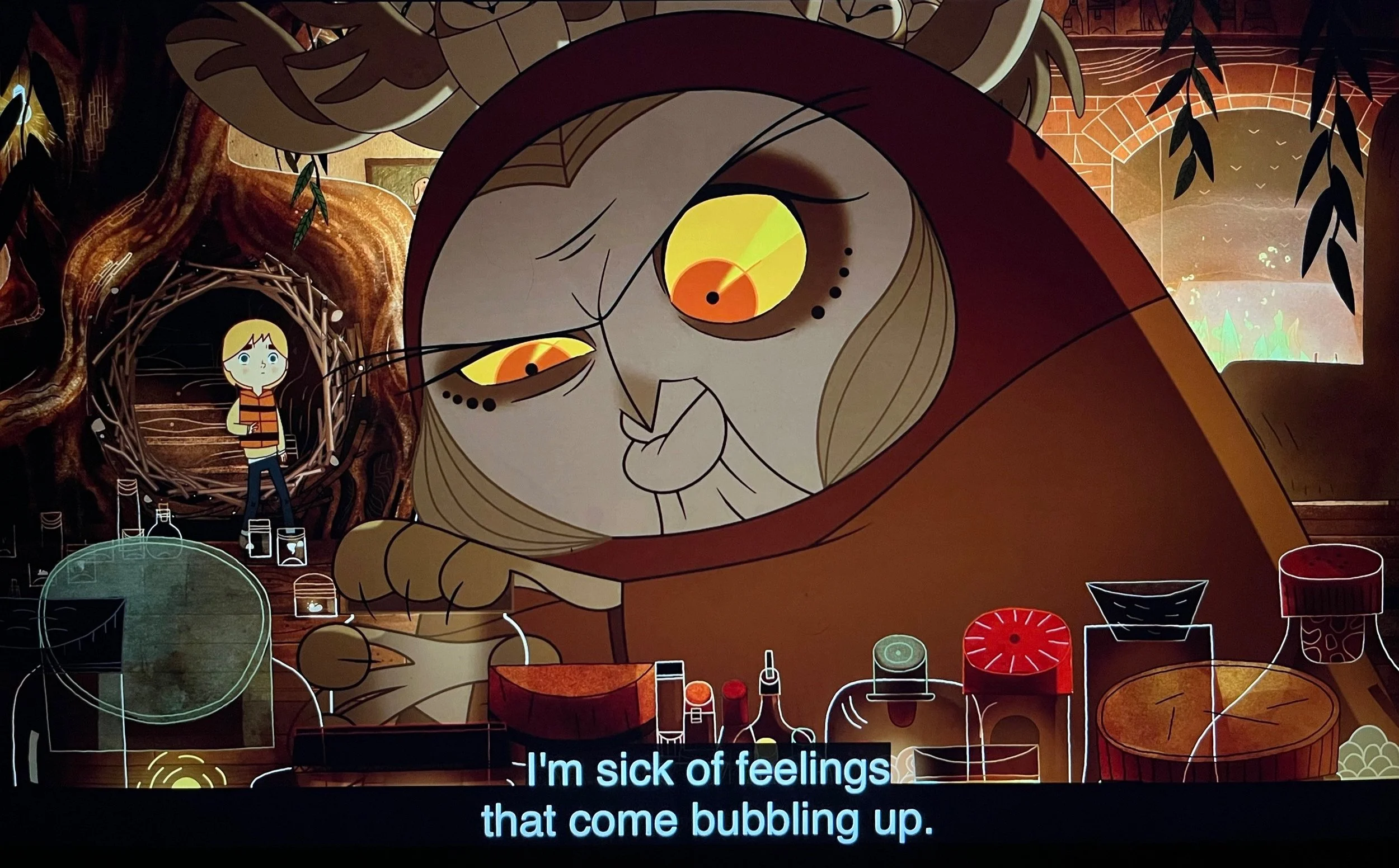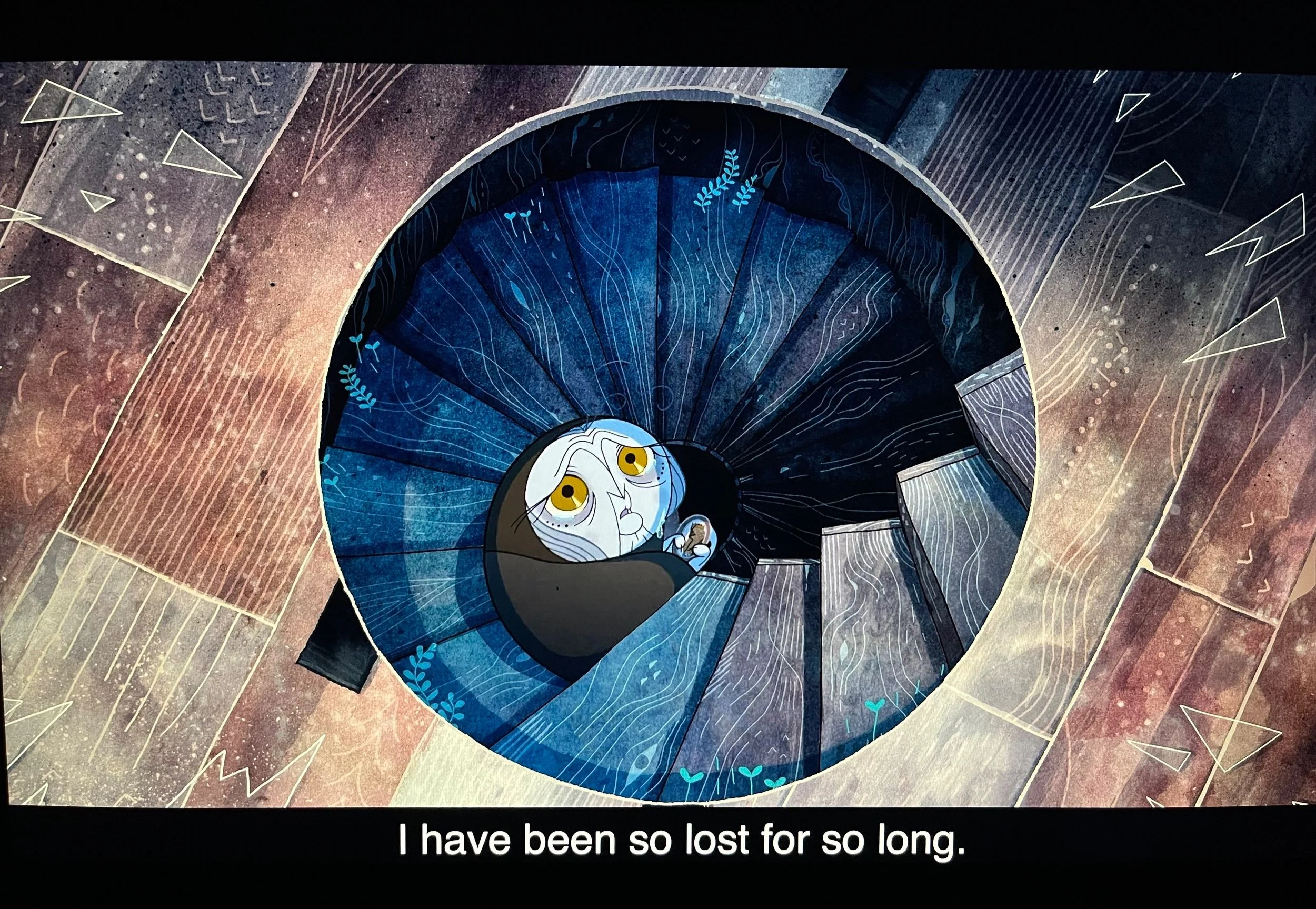Therapy for Confusion about “Who I Am”
I’m Bingwan Liu, a psychotherapist licensed in NY and NJ
My work is inspired by Jungian analysis and our capacity to use metaphors, stories, imagination, and dreams to integrate our experiences
I’m passionate about helping people thrive, especially when you find it hard to imagine
I offer online therapy only and don’t take insurance
Click here to book a free 15-minute phone consultation
There is a witch named Macha who lives deep in the woods. She has the power to suck feelings out of anyone, putting their feelings into enchanted glass jars, turning her victims into stones. She has turned many mythical creatures into stone or driven them out of their homeland to hide from her hunt. She believes that she is helping those who suffer from bad feelings, starting with her son, who has lost his wife and was uncontrollably anguished. Macha also turns herself partially into stone as she puts her intense emotions, like sadness and anger, away in the glass jars.
The antidote to Macha's petrifying power is Saoirse's (SEER-shuh) songs. Saoirse is a young selkie, a magical being that is part human and part seal. She can sing songs that revitalize stone creatures and return them to their original forms. To do this, however, Saoirse has to find her seal coat because she can only sing with her own voice while wearing it. Unfortunately, her dad tossed her coat away because he feared losing her to the ocean.
Macha abducted Saoirse and nearly turned her into a lifeless stone. Saoirse's brother, Ben, a human child, tracks down Macha to save Saoirse. With the help of his dog Cú, Ben resists Macha's persuasion to have his feelings removed. He finds Saorise in Macha's attic and encourages her to blow into a magical seashell, which breaks some of the enchanted glass jars and returns feelings to Macha. Saoirse is now exhausted and dying, having been separated from her seal coat for a long time and partially turned into stone. Reconnected with her feelings, Macha becomes remorseful, finds compassion, and helps Ben, Saoirse, and Cú return home.
Ben dives into the ocean to find Saoirse's seal coat, saving her life. Wearing the seal coat, Saoirse can sing with her voice, reviving all the stone magical beings. As the now-alive magical beings leave the human world, returning to their homeland, Saoirse gives up her seal coat and becomes fully human.
This is the condensed version of the story from the Irish movie The Song of the Sea. This story contemplates that when we cut off our feelings, we become hardened and disconnected from who we are. Macha represents our impulse to deny, isolate, suppress, and cut off our feelings as a quick way to fix our problems. Ask yourself if you have told yourself not to feel because it is painful or too much. Or because you think feelings are useless and get in the way of being productive and accomplishing your goals. However, the consequences of operating this way are becoming trapped, cold, and rigid like stone. For example, you may feel deadened, flattened, and mechanical, like you have lost motivation; you may feel erased of your character, like a husk of a person, disconnected, empty, and hardened in your heart; you may anxiously look to the external to find standards to meet and rules to follow, thus becoming objectified and lost about who you are as a person.
Fortunately, we all have the potential to hear Saoirse's songs. Saoirse represents our innate desire to discover who we are and become fully human instead of remaining a measurable object deprived of individual uniqueness. I have witnessed many people live as if there were some external, universal, right ways to go about life. Let us turn temporarily to a few people I know in real life (some names have been changed for confidentiality, and some stories blurred together for brevity). Amber, 72, wakes up every morning with her first thought, "What should I do today?" as if life were only about doing things. Fei, 42, does not like their job in finance but does not know what they want to do and how they can pivot in their career path. They sometimes ask me impatiently, "What should I do?" expecting me to alleviate their confusion and dissatisfaction with their life by showing them where a different life is to be found. David, 22, has just graduated from college and is confused about his future and love life. He turns to me when he has trouble at work or goes through interpersonal challenges. He asks, "So, what should I do?" looking at me as though I were some kind of authority with the correct answers to his problems. Yet, Amber, Fei, and David have tolerated their frustration in not getting quick answers or advice from me. They brought themselves to therapy every week, learning to find answers from themselves and discover their own truth. They have learned to hear their song.
Some of you may wonder how you can find your answers. Let us turn back to our story and our heroin, Saoirse. Have you considered why Saoirise needs to find her seal coat to sing in her own voice? Metaphorically and psychologically, we must see and feel our "psychic skin" as we learn to express ourselves and discover "who I am." "Psychic skin" is our capacity to tell what is within and outside us. For example, when your parents tell you to be practical and work at a corporate job, do you ask yourself how YOU feel about this? When health experts say you should walk 10,000 steps daily, do you know if this works for YOU? When most of your friends have become married with two kids by 30, do you check in with yourself to figure out if this is what YOU desire? When your manager insists you have done something wrong and criticizes you, do you pause and see if what the manager says reflects YOUR intention and who YOU are?
A more straightforward way to find and get in touch with our "psychic skin" is through sensory experiences. Recently, I asked one of my patients when she last did something for herself and felt good about it. She thought for a few seconds and said she did not know. We decided that she would start small by asking what tea she wants on a particular day and what it is about the tea that she enjoys. For example, is it the flavor? Is it the warmth or the coldness of the tea? Does the tea bring up memories that feel pleasant? Or does she feel settled when she holds the teacup in her hand? This may be a helpful start for you as well.
To sum it up, discovering "who I am" is about sensitively holding ourselves in our minds and attending to our inner experiences, including feelings, sensations, thoughts, and imaginations. The more we ask "How am I?" instead of "What should I do?", the closer we get to our seal coat and our ability to hear and sing our song. The more we orient toward what "I feel," "I want," "I desire," "I value," "I aspire," and "I dislike," the less confused we are about "who I am." As tempting as Macha's controlling strategy is to cut off our feelings, Saoirse must sing her songs and determine her destination. Macha's method may feel easy, but it costs our aliveness, creativity, and spontaneity. Saoirse must endure a long, arduous journey to find and connect with her seal coat. Still, the outcome is the invaluable freedom to express ourselves from the depth of "I am."
FAQs
-
Unfortunately (and fortunately), no. Many of us have grown up in environments where performance, productivity, and meeting others’ expectations were the priorities. Our collective culture in China or the US doesn’t promote self-reflection and self-understanding either. So, your quest about “who I am“ is like swimming against the stream; it’ll take time and effort.
-
I’ll help you recognize your unconscious psychological patterns that hinder you from achieving your life goals. You’ll learn to recognize these patterns for yourself, so you can make changes even after our work ends. This isn’t what a life coach can offer.
Without becoming aware of your unconscious psychological patterns, you’ll run into similar troubles and the same bad moods over and over. I once heard a life coach compliment one of my patients. My patient felt better for a few days, but it didn’t last long, and they needed to go back for more.
You won’t create sustainable changes by having your ego stroked, but you can create long-lasting changes from understanding and changing your psychological patterns.
-
While ChatGPT can provide plenty of information to explain your behaviors, it gives universal, generic answers and doesn’t understand your unique personality and who you are.
Our work also involves helping you gain information about yourself, but you’ll do so by connecting with your experiences, such as your feelings, intuitions, sensations, and instincts. Our work helps you cultivate trust in your own authority rather than relying on external authority, like ChatGPT, for answers.
-
A patient came to me because she doesn’t like her current job, but doesn’t know what she wants to do. During 6 months of working together, she is becoming aware of how she’s taken in misogynistic messages like “I can’t speak my mind because I’ll be viewed as aggressive“ and decides to change how she approaches work. As she starts sharing her thoughts and ideas, she realizes that her managers don’t encourage her but want her to be quiet and “not cause trouble.” She wants to stand by herself and leave her current position. Despite the current job market, she has started working on her resume. Though we don’t know how this will work out, my patient has a change of attitude that affirms what’s important for her instead of undermining herself by staying in an environment that doesn’t respect her boundaries.
Like my patient, you’ll know you’re making progress when you become clearer about what you like and dislike, what you feel good about, what motivates you, and what you value. You’ll know you’re making progress when you start choosing not to survive, meet others’ expectations, or make others happy, but to consider yourself first.



